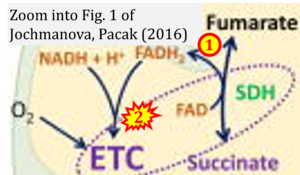Jochmanova 2016 Clin Cancer Res
| Jochmanova I, Pacak K (2016) Pheochromocytoma: the first metabolic endocrine cancer. Clin Cancer Res 22:5001-11. https://doi.org/10.1158/1078-0432.CCR-16-0606 |
Jochmanova I, Pacak K (2016) Clin Cancer Res
Abstract: Dysregulated metabolism is one of the key characteristics of cancer cells. The most prominent alterations are present during regulation of cell respiration, which leads to a switch from oxidative phosphorylation to aerobic glycolysis. This metabolic shift results in activation of numerous signaling and metabolic pathways supporting cell proliferation and survival. Recent progress in genetics and metabolomics has allowed us to take a closer look at the metabolic changes present in pheochromocytomas (PHEO) and paragangliomas (PGL). These neuroendocrine tumors often exhibit dysregulation of mitochondrial metabolism, which is driven by mutations in genes encoding Krebs cycle enzymes or by activation of hypoxia signaling. Present metabolic changes are involved in processes associated with tumorigenesis, invasiveness, metastasis, and resistance to various cancer therapies. In this review, we discuss the metabolic nature of PHEOs/PGLs and how unveiling the metabolic disturbances present in tumors could lead to identification of new biomarkers and personalized cancer therapies.
• Bioblast editor: Gnaiger E
Correction: FADH2 and Complex II
- FADH2 is shown as the substrate feeding electrons into Complex II (CII). This is wrong and requires correction - for details see Gnaiger (2024).
- Gnaiger E (2024) Complex II ambiguities ― FADH2 in the electron transfer system. J Biol Chem 300:105470. https://doi.org/10.1016/j.jbc.2023.105470 - »Bioblast link«
Labels: Pathology: Cancer
Enzyme: Complex II;succinate dehydrogenase


